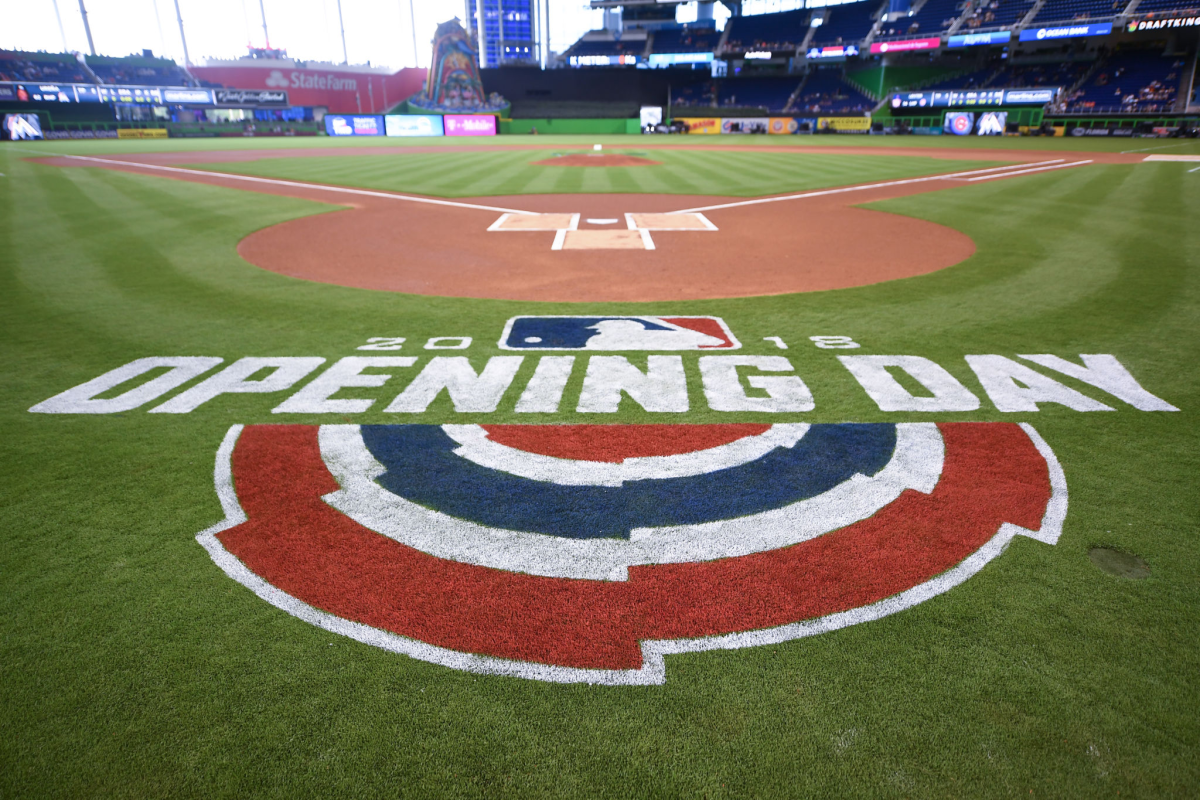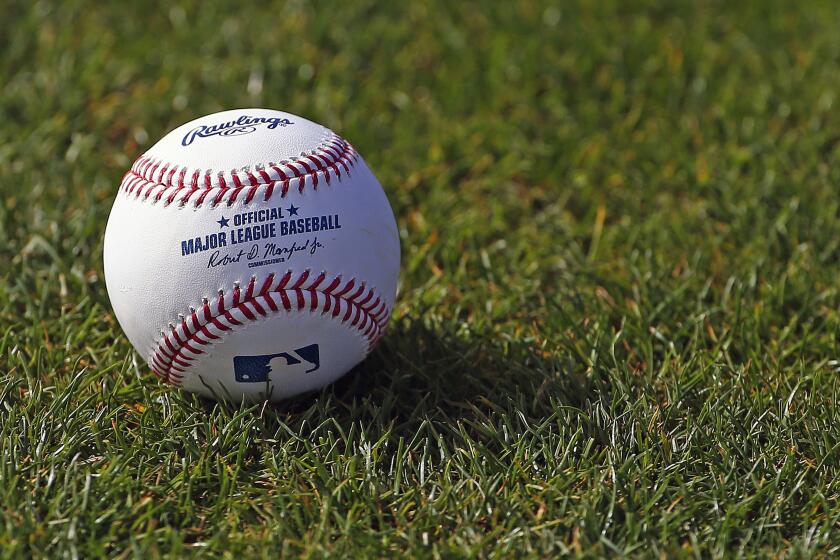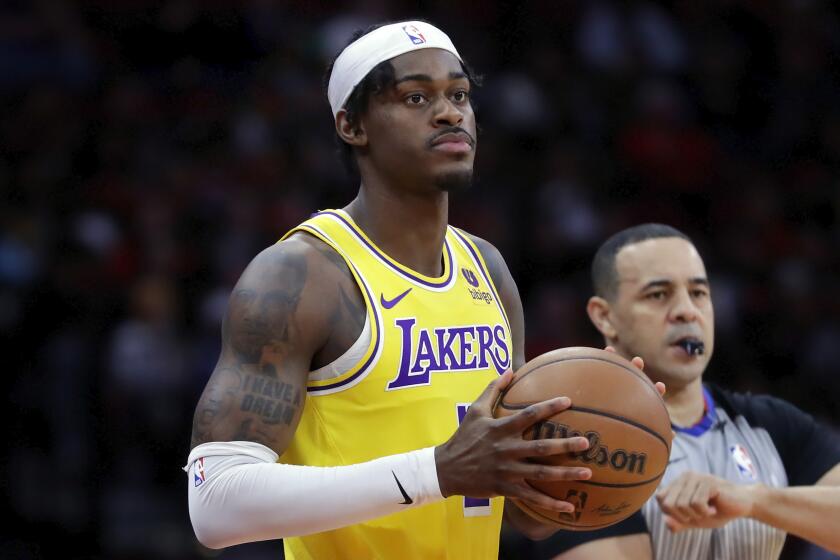News Analysis: How MLB lost the summer to basketball

- Share via
This town, this fall, could be all about basketball.
In September, in the final two weeks of what should be a wacky 2020 baseball season, with the Dodgers and Angels potentially fighting for a postseason berth, the Lakers and Clippers could be battling one another in the NBA Western Conference finals.
In October, whether the Dodgers advance to the playoffs for the eighth consecutive year or the Angels get there for the first time in six years, Los Angeles could be preoccupied with the Lakers or Clippers in the NBA Finals.
Baseball could have taken center stage in July, with an Independence Day launch that would have given the national pastime a four-week head start on the NBA. Yet baseball botched its return so badly that the head start might amount to four days.
It’s Time for Dodger Baseball, in the shadows of the NBA, and subject to interruption by a killer virus.
MLB commissioner Rob Manfred was given the go-ahead by owners to exercise his authority to impose a pandemic-shortened regular season as agreed upon March 26.
On Monday, after Major League Baseball owners and players traded bargaining proposals, hostile lawyer letters and accusatory public statements for more than a month, the two sides officially gave up on making a deal. The league and its players’ union instead decided to implement the terms of a March 26 agreement, under which the players earn prorated pay for every game played this season and the owners dictate how many games the season will include.
The season is expected to be 60 games, starting on or about July 24, provided a health and safety protocol can be finalized this week. The season is normally 162 regular season games, plus playoffs but it has been cut short by the COVID-19 pandemic.
The unresolved questions include sensitive ones.
For example: Angels star Mike Trout is not thought to be at high risk for contracting the coronavirus, but his wife is due to give birth to the couple’s first child during the season. Could Trout be excused for this two-month season without forfeiting his salary? And would players reluctant to complete an entire season under quarantine be willing to do so to complete the postseason?
The teams are expected to stage a second spring training as soon as next week at their home ballparks, largely chased from Arizona and Florida training sites by surges in the virus in those states. The league then would monitor the virus to see whether it appears under control to start the season, or whether the spread of the virus might force the season be called off before it could start.
The sides could have made this deal six weeks ago, and players would have been in spring training by now.
Owners insisted that, because games without fans would mean less revenue than games with fans, players should take less money to play them. The March 26 agreement provided for prorated salaries regardless of attendance, but the owners did not include that until their fourth proposal.
Players insisted that the season could extend into November and even December, proposing seasons of as long as 114 games. Owners rejected those bids because of concerns about a possible second wave of the coronavirus — Dr. Anthony Fauci, director of the National Institute of Allergy and Infectious Diseases, told The Times he would wrap up the season in September — and because the league’s television partners want the postseason to end in October.
The failure to reach an agreement meant that radical changes proposed during negotiations — the permanent adoption of the designated hitter in the National League, a postseason expanded from 10 teams to 16 and advertising patches on uniforms — were put on hold until at least the 2022 season, pending negotiations on a new collective bargaining agreement.
Those future negotiations were expected to be stormy even before the coronavirus emerged, as industry revenues have risen in recent years while salaries have remained flat. The negotiations now could be complicated by a grievance the players’ union is expected to file against the league.
The union would argue the league did not “work in good faith to … complete the fullest 2020 championship season and post-season that is economically feasible,” as it was written in that that March agreement. The union believes owners stalled negotiations to be able to impose a season and say time would not permit a longer one, and the difference in collective salary could amount to hundreds of millions of dollars in damages.
The league would argue, presumably with documentation to back up the claims it has made publicly, that commissioner Rob Manfred and union chief Tony Clark agreed last week on a 60-game season, only to have the union renege on the deal. Clark has called that claim “unequivocally false.”
The MLB players’ union has rejected the owners’ 60-game proposal, leaving the league with these three options concerning the 2020 season.
The league also would argue that Manfred did not punitively reduce the schedule beyond his final offer and that players did not negotiate in good faith for possible tradeoffs to reduced salaries. The owners do not consider themselves at significant risk of having to pay damages.
After getting routed in the last round of collective bargaining, the players remained strong this time, turning down an offer worth a collective $300 million more than they will earn now, standing firm against any dilution of their prorated salaries in the hope that an arbitrator might award them even more in the end.
This season will most likely be completed before the grievance process, so for now Dodgers fans await the 11 words they have longed to hear in the four months since the team Dodgers acquired one of the most dynamic players in baseball from the Boston Red Sox:
“Leading off for the Dodgers, right fielder, number 50, Mookie Betts.”
More to Read
Go beyond the scoreboard
Get the latest on L.A.'s teams in the daily Sports Report newsletter.
You may occasionally receive promotional content from the Los Angeles Times.












